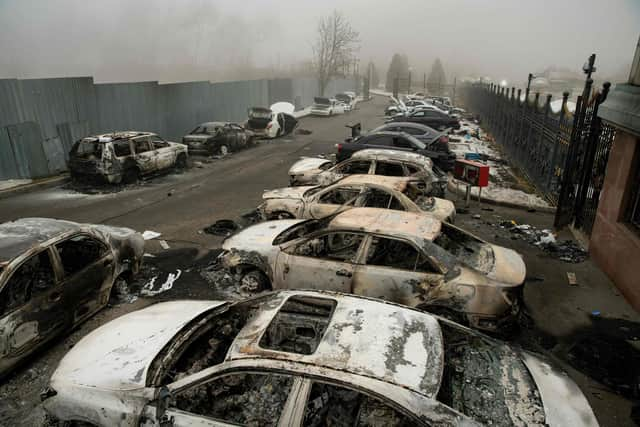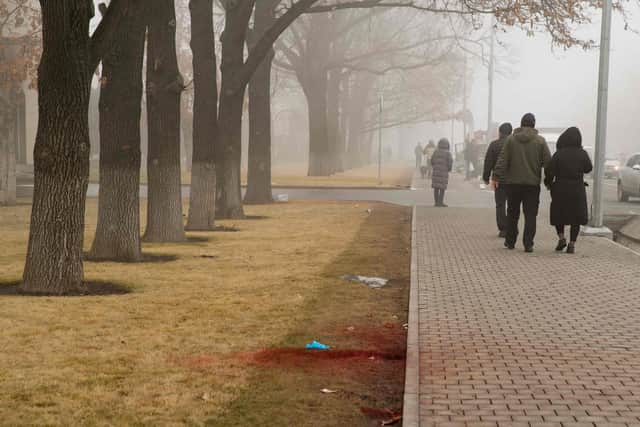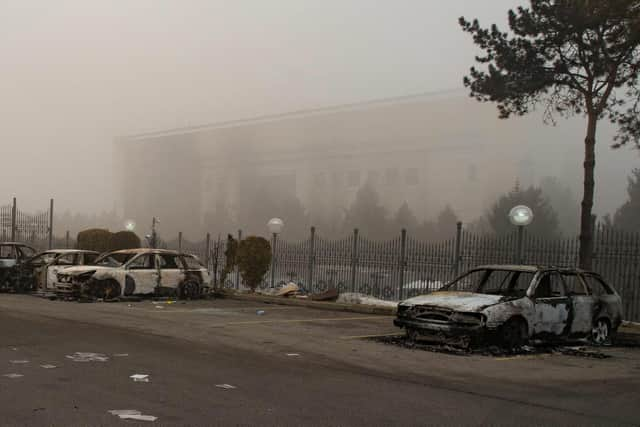Kazakhstan: What prompted the Kazakhstan riots and what's happened so far?
Dozens of protesters have been killed in Kazakhstan in attacks on government buildings and at least a dozen police officers have died, including one who was found beheaded, authorities said.
Police spokeswoman Saltanat Azirbek said there were attempts to storm buildings in the country's largest city, Almaty, during the night and that "dozens of attackers were liquidated".
Advertisement
Hide AdAdvertisement
Hide AdThe reported attempts to storm the buildings came after widespread unrest in the city on Wednesday, including the seizure of the mayor's building, which was set on fire.
State news channel Khabar-24 cited the city commandant's office as saying that another 353 law enforcement officers were injured in addition to the 12 killed.
Here’s more background on what started the unrest in Kazakhstan and what some of the immediate effects have been.
What prompted the Kazakhstan riots?
Kazakhstan is experiencing the worst street protests the country has seen since gaining independence three decades ago.


Beginning at the weekend, the protests were initially centred around rising fuel prices in the west of Kazakhstan.
As the unrest spread across the country, the protests changed to be more generally about corruption, poverty, and inequality.
The protesters have demanded reform and better standards of living from the government, but have no clear leader currently to communicate these demands in an organised manner.
Police have clashed repeatedly with demonstrators in recent days, deploying water cannons in the freezing weather, and firing tear gas and concussion grenades.


At least 2,000 people have been arrested in Almaty so far.
Advertisement
Hide AdAdvertisement
Hide AdWhat has been the response to the Kazakhstan riots so far?
A Russia-led military alliance said it will send peacekeeping forces to Kazakhstan after the country's president asked for help in controlling the protests which were sparked by a rise in fuel prices but escalated sharply.
President Kassym-Jomart Tokayev appealed to the Collective Security Treaty Organisation (CSTO), a Moscow-based alliance of six former Soviet countries, for assistance.


Hours later, the CSTO's council approved sending an unspecified number of peacekeepers, said Armenian Prime Minister Nikol Pashinyan, the council's chairman.
The Guardian, among others, have reported that Russian paratroopers have now arrived in Kazakhstan.
Al Jazeera has questioned whether the Russian-led military alliance of former Soviet states could provide the opportunity for Russia to restore power in Kazakhstan.
Mr Tokayev earlier vowed to take harsh measures to quell the unrest and declared a two-week state of emergency for the whole country, expanding one that had been announced for both the capital of Nur-Sultan and Almaty that imposed an overnight curfew and restricted movement into and around the urban areas.
The government resigned in response over the unrest.
What have been some of the immediate effects of the Kazakhstan riots?
Kazakh news sites became inaccessible late in the day, and the global watchdog organisation Netblocks said the country was experiencing a pervasive internet and telephone blackout.
Although the protests began over a near-doubling of prices for a type of liquefied petroleum gas that is widely used as vehicle fuel, their size and rapid spread suggested they reflect wider discontent in the country that has been under the rule of the same party since gaining independence from the Soviet Union in 1991.
Advertisement
Hide AdAdvertisement
Hide AdMr Tokayev claimed the unrest was led by "terrorist bands" that had received help from unspecified other countries.
He also said rioters had seized five airliners in an assault on Almaty's airport, but the deputy mayor later said the airport was working normally.
Kazakhstan, the ninth largest country in the world, borders Russia to the north and China to the east and has extensive oil reserves that make it strategically and economically important.
The Week has drawn parallels with the potential for Russian control of Kazakhstan and the ongoing situation in Ukraine.
Additional reporting by PA.
Comments
Want to join the conversation? Please or to comment on this article.
